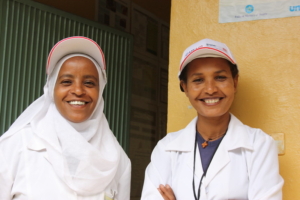 Ethiopia, a nation steeped in history and brimming with cultural wealth, grapples with a stark reality: poverty grips a significant portion of its population. Around one-third of Ethiopians struggle below the national poverty line. However, amidst this hardship, a flicker of hope shines through – a burgeoning internet user base. Today, one in five Ethiopians is connected to the digital world, opening doors to utilize cutting-edge technologies like artificial intelligence (AI) to tackle the country’s most pressing challenges and pave the path towards poverty eradication by harnessing technology to combat poverty.
Ethiopia, a nation steeped in history and brimming with cultural wealth, grapples with a stark reality: poverty grips a significant portion of its population. Around one-third of Ethiopians struggle below the national poverty line. However, amidst this hardship, a flicker of hope shines through – a burgeoning internet user base. Today, one in five Ethiopians is connected to the digital world, opening doors to utilize cutting-edge technologies like artificial intelligence (AI) to tackle the country’s most pressing challenges and pave the path towards poverty eradication by harnessing technology to combat poverty.
AI Powered Tools for Ethiopia
Imagine AI-powered tools analyzing weather patterns and advising farmers on optimal planting times and crop selection, maximizing yields and mitigating the drought risk – a frequent threat in Ethiopia. This potential is not merely hypothetical. A project by the International Crops Research Institute for the Semi-Arid Tropics (ICRISAT) uses AI to analyze satellite imagery and provide farmers with personalized agricultural advice, leading to a 20% increase in yields for participating farmers.
Business Analysis With AI
Beyond agriculture, AI can empower financial inclusion. Ethiopia boasts a young population, many needing access to traditional banking services. AI-powered mobile banking platforms can bridge this gap, offering secure and convenient financial services to millions, fostering entrepreneurship and driving economic growth. For instance, the AI-powered mobile money platform M-PESA has revolutionized financial inclusion in Kenya, increasing financial access for millions and boosting overall economic activity.
Growth of Ethiopian Heath Care With AI
The potential of AI extends even further. In health care, AI improves public health outcomes and reduces treatment costs. According to the Novartis Foundation and Microsoft, post-COVID-19 artificial intelligence plays a crucial role in Africa. The study “Reimagining Global Health through Artificial Intelligence: The Roadmap to AI Maturity” examines how adopting AI-based health solutions can help low-income countries overtake high-income ones. Compared to conventional techniques, artificial intelligence in health care offers numerous advantages:
- AI systems are capable of analyzing vast volumes of data. They can comprehend patients’ conditions more thoroughly than a human physician.
- Using AI lowers error rates while performing surgery or administering medication to patients.
- AI algorithms can analyze medical data to diagnose diseases at early stages.
According to the 2020 Partech report, $189 million in funding was given to African companies in the health technology space in 2019. This sum is equivalent to a 969 % increase over 2018 and represents 9.3% of the total amount granted to entrepreneurs operating in Africa. As a result, the health technology industry is raising substantial capital and expanding.
Improvising Teaching Methods With AI
AI-powered tutors can personalize learning experiences, catering to individual student needs and enhancing educational attainment. Of course, harnessing AI effectively as a technology to combat poverty requires careful consideration. Ethical concerns surrounding data privacy and potential job displacement must be addressed with comprehensive regulations and responsible implementation. Additionally, digital literacy initiatives are crucial to ensure equitable access and prevent exacerbating existing inequalities.
Conclusion
Ethiopia’s burgeoning internet user base presents a unique opportunity to leverage AI technology to combat poverty and promote sustainable development. By embracing this technology responsibly and inclusively, Ethiopia can unlock a brighter future for its people, transforming challenges into opportunities and paving the way for a more prosperous and equitable society.
– Vincenzo Marino
Photo: Wikimedia Cpmmons

 Ethiopia, often associated with its rich history, diverse culture and stunning landscapes, is also making a name for itself in the global floriculture industry. This emerging sector has not only created jobs and economic opportunities but has also played a significant role in poverty alleviation in Ethiopia.
Ethiopia, often associated with its rich history, diverse culture and stunning landscapes, is also making a name for itself in the global floriculture industry. This emerging sector has not only created jobs and economic opportunities but has also played a significant role in poverty alleviation in Ethiopia. 
 There is a lack of health care workers in Ethiopia, particularly in the areas with the highest poverty rates. This has significantly impacted the availability and caliber of health care services, thereby aggravating public health issues.
There is a lack of health care workers in Ethiopia, particularly in the areas with the highest poverty rates. This has significantly impacted the availability and caliber of health care services, thereby aggravating public health issues.  Situated along the eastern coast of the Horn of Africa, sits the populous nation of Ethiopia. Like many nations in the sub-Saharan region, Ethiopia has been heavily impacted by the tide of Human Immunodeficiency Virus Infection and Acquired Immune Deficiency Syndrome, commonly known as HIV/AIDS. Modern advancements in education, health care and prevention seek to eradicate the disease’s devastating impact.
Situated along the eastern coast of the Horn of Africa, sits the populous nation of Ethiopia. Like many nations in the sub-Saharan region, Ethiopia has been heavily impacted by the tide of Human Immunodeficiency Virus Infection and Acquired Immune Deficiency Syndrome, commonly known as HIV/AIDS. Modern advancements in education, health care and prevention seek to eradicate the disease’s devastating impact.

 Food security in Ethiopia is largely dependent on climate. This is what makes the 2011 Horn of Africa drought so devastating. The drought left
Food security in Ethiopia is largely dependent on climate. This is what makes the 2011 Horn of Africa drought so devastating. The drought left  The Horn of Africa continues to be a part of the world that suffers from food insecurity as a result of drought and conflict. Ethiopia, a core part of this region and its issues, has over
The Horn of Africa continues to be a part of the world that suffers from food insecurity as a result of drought and conflict. Ethiopia, a core part of this region and its issues, has over 